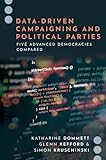Data-driven campaigning and political parties: Five advanced democracies compared by Katharine Dommett, Glenn Kefford, & Simon Kruschinski
Material type: TextLanguage: English Series: Journalism and political communication unbound seriesPublisher: [2024]Description: 246p.; 25 cmContent type:
TextLanguage: English Series: Journalism and political communication unbound seriesPublisher: [2024]Description: 246p.; 25 cmContent type: - text
- unmediated
- volume
- 9780197570227
- 9780197570234
- W:91.2 R4
| Item type | Current library | Home library | Call number | Status | Barcode | |
|---|---|---|---|---|---|---|
 Textbook
Textbook
|
Arts Library | Arts Library | W:91.2 R4 (Browse shelf(Opens below)) | Available | AL1804209 |
Browsing Arts Library shelves Close shelf browser (Hides shelf browser)
Includes bibliographical references (pages 211-240) and index.
"What is data-driven campaigning? According to prevailing accounts, this idea describes the rise of increasingly sophisticated, highly targeted and often invasive uses of data. Deployed to suppress votes, manipulate voter preferences or boost a candidates' popularity, the power of data is seen to be transforming campaigning practice and raising democratic concerns. And yet, there is a significant problem with these ideas: we have at best a partial understanding of the nature of data-driven campaigning, and limited clarity about its implications This book provides unprecedented insight into the conduct of data-driven campaigns. Presenting data from interviews with over 300 professional campaigners in Australia, Canada, Germany, the UK and US, we provide unique insight into the components of data-driven campaigning by political parties. We make three key contributions. First, distinguishing between data, analytics, technology and personnel, we provide unmatched descriptive insight into these four components of data-driven campaigning, revealing significant variation in its operationalization dependent on party and country context. Second, introducing a novel multi-level theoretical framework, we isolate systemic, regulatory and party level variables which help explain the reasons for these differences. Third, we consider the implications of our findings for debates about democracy, data and technology in the 21st century. Cumulatively these contributions reveal data-driven campaigning to come in different forms which are not inherently problematic. Giving voice to practitioner perspectives, through interviews and innovative 'vignettes', this book recasts the debate around data-driven campaigning, offering important lessons for scholars, campaigners and policymakers alike"-- Provided by publisher.
There are no comments on this title.








